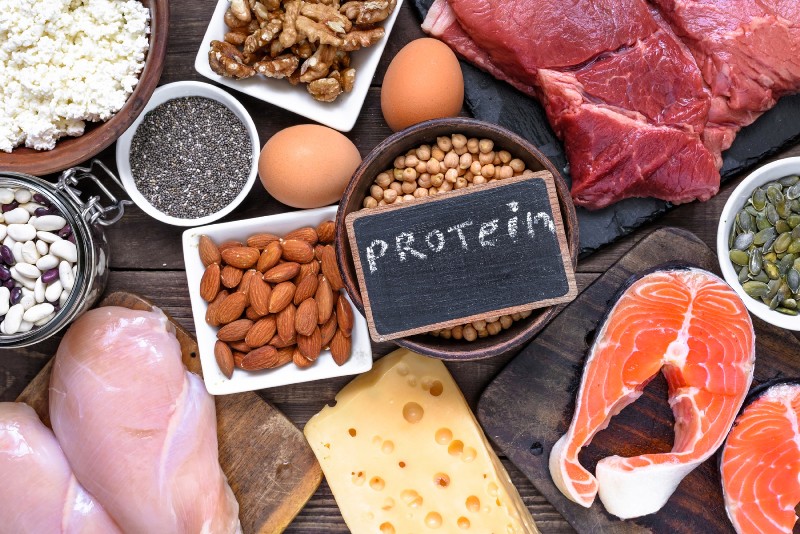High-Protein Diet: Benefits & Risks

From the bodybuilder who lives on the steak to the fitness guru who consumes protein shakes in a gulp, high-protein diets have been the subject of conversation in the health industry over the last few years. Considering the advantages of a high protein diet, such as gains in muscle mass, weight loss, increased metabolism, and a decrease in appetite, it isn’t too difficult to understand why the hype around high-protein diets has grown rapidly.
It’s true that eating enough protein is crucial for healthy living but is it worth the effort to increase your protein intake to the upper levels to assist in weight loss? If yes, then is there such a thing as excessive protein? Here’s everything you need to be aware of.
What is an eating plan that is high in protein?
A high-protein diet is one that contains at least 0.6-1g of protein per pound of body weight per day.
If you’re on a protein-rich diet, you could get protein from animal-based sources like fish, meat, and eggs and plant-based protein sources like tofu, beans, legumes, as well as Vegan protein powders.
Alongside tracking your intake of protein, a high-protein diet typically includes:
- Consuming 1-2 servings of protein with each meal
- Consuming fewer processed carbohydrates
- Utilizing high-quality protein powders to increase your protein intake
You can follow an eating plan which is high in protein to build muscle mass or lose weight. Consuming high amounts of protein will cause you to feel fuller and makes it easier to eat fewer calories.
While there are no fixed guidelines, many individuals who are on a high-protein diet for weight loss prefer eating more lean protein. However, they should avoid refined carbohydrates and sugars to maximize their results and boost their overall health. You can also check in with your doctor’s app to get help in making a high protein diet plan for you.
How much protein is on a high-protein diet?
While the recommendations may differ, a high-protein diet typically contains a minimum of 0.6 grams of protein per pound of body weight every day. For example:
- 9 Stone (57kg): 76g protein
- 75 stone (63.5kg): 84g protein
- 11 stones (70kg): 92g protein
Several experts suggest a greater daily intake of protein that is equal to or is higher than 1g of protein per pound of body weight every day, such as:
- 9 Stone (57kg): 126g protein
- Ten stone (63.5kg): 140g protein
- 75 stone (70kg): 154g protein
In comparison, the Reference Nutrient Intake (RNI) of protein for healthy adults to 0.75g of protein for every kilogram of body weight daily. For instance:
- 9 stone (57kg): 43g protein
- 2 stone (63.5kg): 48g protein
- 75 stone (70kg): 53g protein
Why is protein essential for health?
Protein is present within every single cell of the body – your skin, muscles, hair, bones, tissues- and performs various vital functions. As an essential building block of your body, it contributes to the growth and development of bones, tissues, muscles, cartilage, hair, and the skin.
Protein also aids in the creation of enzymes and hormones, transports oxygen and nutrients throughout the body, and supplies the body with about 10% to 15% of its daily energy. Protein is essential to ensure the development and growth of your child during pregnancy and childhood.
Protein is among the three macronutrients, along with fats and carbohydrates. They are three primary nutritional groups that your body requires to stay alive and carry out its primary duties. The body needs large amounts of these macronutrients to carry out its primary functions.
Protein is composed of more than 20 amino acids, which are the building blocks of protein. Nine of them are known as essential amino acids: histidine, Isoleucine, Leucine, Lysine, Methionine, Phenylalanine, Threonine, Tryptophan and Valine. The body can’t create the nine amino acids by itself, which means that you have to get them from the high-protein foods you consume.
Benefits of a high-protein diet:
While protein is an essential element of any healthy diet, adhering to an incredibly protein-rich diet has many benefits that are backed by science:
- Reduces your appetite
Protein is a great way to feel fuller for longer and lessen your appetite. This is one of the key benefits of a diet high in protein.
Your appetite is controlled by your brain and is influenced by various hormones that promote satiety. They tell your brain when and how much you need to eat. Research has shown that a high protein diet boosts the levels of three hormones that reduce appetite while reducing the amount of ghrelin, a hormone that makes you feel hungry.
Protein takes longer to process than carbohydrates, which adds to its appetite-reducing effects. When combined, these factors could decrease appetite, which will allow you to consume fewer calories and lose weight.
- It helps you to burn more calories
Protein contains the most TEF (thermic impact of foods) out of the three macronutrients. This means that it will help you reduce calories.
The thermogenic effects of eating (TEF) refer to the energy your body requires to digest and process the food you consume. If you consume proteins, 20-30 percent of the calories you consume are used up in digestion. This is much higher than carbohydrates (5-10 percent) or fat (0-3 percent).
In terms of perspective, if we were to consume 300 calories in protein per day, the body would consume between 60 to 90 calories in digestion. This higher energy expenditure could aid in losing or keeping weight off naturally.
- Enhances the size of your muscles and your strength
One of the main advantages of a high protein diet is the growth of muscles. If you are trying to lose weight, it could assist in losing fat while reducing muscle loss.
If you’re losing weight, you’ll likely shed muscle and fat. This is due to the fact that your body can convert the mass of your muscles (as well as the fat) to energy when you are in a calorie deficit. By giving your body more protein, you’ll be able to ensure that there’s enough to ensure the health of your muscles and your energy requirements.
In a 2012 study, two adult groups were placed on a diet that was low in calories. However, one group with high-protein and the other was low. At the end of the study, both shed an equal amount of weight, but the high protein diet group was able to keep the bulk of their lean muscle mass.
- Your bones are strengthened
A diet high in protein will help strengthen bones and prevents osteoporosis.
Protein is a major component in your bone’s structure. It helps in the absorption of calcium and is a crucial source of nutrients that are essential for maintaining bone health. Because of this, the consumption of high-protein foods is becoming more linked to a higher bone mass and less fractures when combined with a sufficient calcium intake.
General Physican in Thane states that eating enough protein, at least two servings a day, can help in protecting your bones.
- Improves sleep
One of the less well-known benefits of a diet high in protein is that it may help to improve and induce sleep.
Tryptophan is an amino acid present in a majority of protein foods and enhances the hormone responsible for sleep called melatonin. Tryptophan is present in various protein-rich foods, particularly poultry, dairy products, peanuts, and eggs.
Research suggests that eating enough protein before going to sleep can be associated with better quality sleep and may help you to wake up less through the night.



















